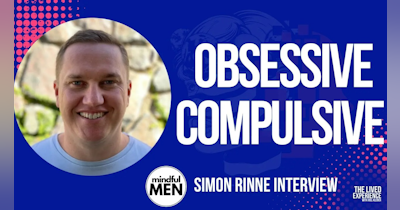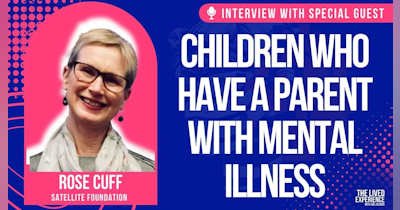Overcoming Shadows: A Candid Conversation with Carly Baxter on Growing Up with a Mother Battling Mental Illness
Welcome to another insightful episode of our podcast, where we delve into stories that inspire, provoke thought, and kindle a deeper understanding of life's complexities. Today, we are privileged to share a captivating conversation with Carly Baxter, a woman who has lived an extraordinary life shaped by daunting circumstances.
As a child, Carly found herself thrown into an environment where normality was a luxury. Her mother, diagnosed with bipolar disorder and schizophrenia, battled the monsters within her mind, while Carly and her siblings waged a war against the world outside, trying to comprehend their mother's illness and its effects.
Carly's story unfolds the harsh reality of growing up in the shadow of mental illness, the impact it had on her family dynamics, the coping mechanisms they had to devise, and the school-related challenges she faced. But more than a tale of struggle, it is a testament to Carly's resilience and her journey toward healing and advocacy.
Through this conversation, Carly hopes to raise awareness about the struggles children with mentally ill parents undergo. She aims to break the stigma surrounding mental illness and be a beacon of hope for others. So, fasten your seat belts as we embark on this poignant journey that is sure to touch your heart and stir your soul.
Joel Kleber: Carly, thank you for joining us on this podcast. I'm aware of your journey, and it's an honor to have you share your story with us today. Let's dive right in. Can you start by describing your family background?
Carly Baxter: Thank you, Joel, for the opportunity. I come from a rather large family, being the youngest of ten siblings. Our family dynamic was greatly influenced by my mother's mental health. She suffered from bipolar disorder and schizophrenia, a combination that heavily influenced her behavior and our upbringing. Her mental health problems required serious medication, which, in turn, rendered her mostly bedridden. As a child, this translated to me missing out on the quintessential mother-child bonding experience.
JK: That sounds extremely tough. Can you talk more about how her mental health issues shaped the dynamics within your family?
CB: Absolutely, Joel. You see, having a parent with a mental health disorder creates an atmosphere of uncertainty. Our household was always on edge, tense, trying to navigate the landmines that could trigger an episode. Her frequent hospitalizations meant that she was physically absent quite a lot. These periods were tough because, not only did we have to worry about her well-being, but we also had to continue our lives without her. To make things worse, my most vivid memories of my mother are linked with her illness, not the joyful, nurturing moments one would typically associate with their mother.
JK: Those are certainly difficult circumstances for a child. How did you and your siblings manage to cope with this situation?
CB: We were forced into a state of accelerated maturity. The responsibilities that usually fell onto the parents had to be shouldered by my older siblings, and I, as the youngest, had to learn from them quickly. They essentially became my guides, helping me navigate through the turbulent times. One of the most valuable skills I acquired during this period was the ability to read people and situations. This skill was crucial for survival. There were also periods of intense anger and protectiveness towards my mother, emotions that were fueled by our circumstances. But these mechanisms were vital for us to continue living in such an environment.
JK: It's clear that your mother's treatment heavily influenced your family's dynamics. Can you elaborate more on her treatment and its impact on your family?
CB: My mother underwent a combination of heavy medication and shock treatment for her condition. Unfortunately, instead of improving her condition, these treatments seemed to progressively worsen it. As her dependence on the medication increased, her ability to function normally decreased drastically. This meant she was mostly bedridden and unable to partake in everyday family activities. Her lack of presence was incredibly challenging, and there's a glaring void where memories of a caring, present mother should exist. The hospitalization periods, her memory loss due to shock treatment – all these further compounded the challenges we had to face.
JK: Despite these obstacles, you've been able to transform your experiences into advocacy. Can you tell us more about your healing journey and how you're using it to support others?
CB: Joel, I've always been a firm believer in the power of shared experiences. I wanted to support children going through similar situations, and that led me to share my story on platforms like your podcast. My intention is to raise awareness about the trials faced by those growing up with a parent battling mental illness and to open up discussions about mental health. To achieve this, I've reached out to numerous organizations and individuals who offer support to children in such circumstances. By sharing my journey, I've been able to provide resources, lend a listening ear, and contribute to the formation of a supportive community for children affected by parental mental illness.
JK: Your efforts are commendable, Carly. Now, I understand that these circumstances also had an impact on your school life. Could you speak on that?
CB: Certainly, Joel. My home circumstances spilled over to my school life, creating additional hurdles. For instance, the school failed to address simple issues such as laundry, leaving me without clean and appropriate clothing. This had a profound impact on my self-esteem and overall wellbeing. The lack of understanding and support from the school added to the struggles I was facing at home. It's crucial for schools to be more attentive to the needs of students who have family members struggling with mental illness. These children face unique challenges that affect not just their academic performance but their social development as well. A supportive and understanding environment at school could make a significant difference.
JK: Absolutely, Carly. Before we wrap up, is there any message you'd like to share with anyone who might be going through what you did?
CB: If there's one thing I'd like them to know, it's that they're not alone. There are others who understand what they're going through and want to help. It's normal to experience a whirlwind of emotions, from anger to confusion. What's important is that they reach out and seek help. Together, we can build a supportive community, keep the conversation going about mental health, and, most importantly, break the stigma surrounding it.
JK: Carly, thank you for your openness and for the crucial work you're doing. It's been an absolute pleasure having you on our podcast today.
CB: The pleasure has been all mine, Joel. Thank you for giving me the platform to share my story.
FAQ's
-
What are bipolar disorder and schizophrenia, and how do they differ?
Bipolar disorder is a mental health condition that causes extreme mood swings, including emotional highs (mania or hypomania) and lows (depression). On the other hand, schizophrenia is a severe mental disorder where people interpret reality abnormally, resulting in a combination of hallucinations, delusions, and extremely disordered thinking and behavior.
-
What are the symptoms of bipolar disorder and schizophrenia?
Bipolar disorder is characterized by periods of unusually intense emotion, changes in sleep patterns and activity levels, and unusual behaviors. These distinct periods are known as mood episodes and are drastically different from the moods and behaviors typical for the person. On the other hand, symptoms of schizophrenia include hallucinations, delusions, thought disorders, and movement disorders.
-
How are bipolar disorder and schizophrenia diagnosed?
Both bipolar disorder and schizophrenia are diagnosed based on specific criteria, including a thorough psychiatric evaluation, a medical history assessment, and medical and psychological tests. It's important to note that these conditions are diagnosed by a healthcare professional or a mental health expert and not through self-assessment.
-
What treatment options are available for people with bipolar disorder and schizophrenia?
Both bipolar disorder and schizophrenia are typically treated through a combination of medication, psychotherapy, and lifestyle changes. Medication is often the cornerstone of treatment, while psychotherapy can provide education and support that helps the person understand their condition and manage their symptoms. Lifestyle changes, such as regular exercise and adequate sleep, can also help manage symptoms.
-
Can a person with bipolar disorder or schizophrenia lead a normal life?
With the right treatment and support, people with bipolar disorder or schizophrenia can manage their symptoms and lead meaningful lives. The key is to have a strong support system, adhere to the treatment plan, and maintain a healthy lifestyle.











